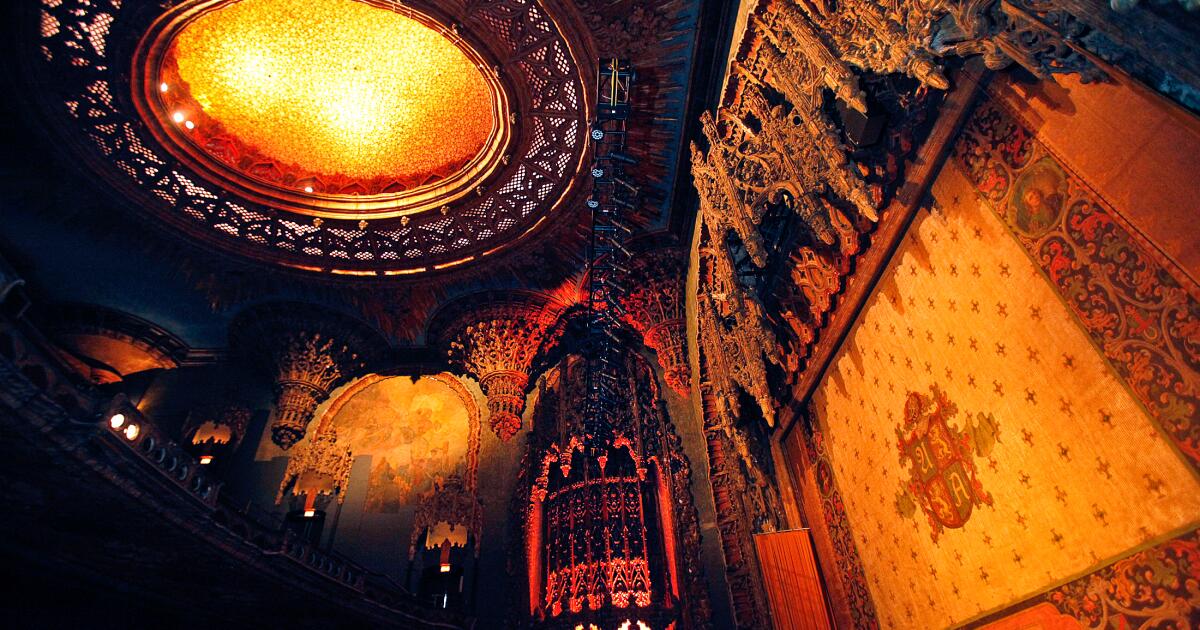The former Ace Hotel in downtown Los Angeles, which helped lead an economic revival of that historic stretch of Broadway a decade ago, has reopened with bare-bones, Airbnb-like services, following a strategy that has become increasingly common for struggling hotels in recent years.
The vintage 1920s hotel tower, now called Style Downtown Los Angeles by Casa, has reopened on a limited basis after closing about six months ago. Downtown hotels have been particularly hard hit by the pandemic, with some changing owners or operators.
Ace Hotel Group has operated the 182-room hotel near Broadway and Olympic Boulevard since it opened in 2014, but it has changed owners twice over the years. The chic brand has made the Ace a destination not only for tourists but also for locals who patronize its bustling rooftop bar and restaurant.
South Korea’s AJU Continuum, which acquired the hotel in 2019, announced last week that it had hired Casa Living to manage the property.
Based in San Francisco with a national presence, Casa “combines the consistency of a major hotel chain with the convenience and character of a modern short-term rental,” AJU Continuum said in a statement.
Upon its withdrawal, Ace Hotels announced that the Broadway hotel would become a “limited-service, rooms-only operation managed through a technology platform.”
The limited-service model, in which guests typically receive a code on their mobile phone to enter their room, is “essentially Airbnb on steroids,” said Donald Wise, a hotel investment banker at Turnbull Capital Group. “Instead of going into someone’s house or apartment, you go into a box where you get the same service as Airbnb.”
The hotel’s adjacent Broadway independent United Theatre will remain open as an open venue hosting concerts, performances and special events, according to AJU Continuum. The hotel will have a rooftop wine bar but no restaurant.
The site has played a variety of roles since it was built in 1927. Built with the support of film greats Mary Pickford, Douglas Fairbanks, Charlie Chaplin and DW Griffith, it was originally built to provide a theatre for the United Artists film production company they founded.
The Spanish Gothic-style theater was designed by C. Howard Crane and the tower was by Walker & Eisen, the team behind such local landmarks as the Fine Arts Building downtown and the Beverly Wilshire Hotel in Beverly Hills. The theater housed rental offices and a theater where United Artists films premiered, including Pickford’s “My Best Girl.”
Other notable occupants of the land over the years included the California Oil Company, Texaco, and the flamboyant, nationally syndicated preacher Gene Scott, who died in 2005.
The Ace’s opening in 2014 marked a key point in downtown’s housing revival and sparked growth in the neighborhood, said Nick Griffin, executive vice president of the DTLA Alliance, the former Downtown Center Business Improvement District.
“It harkens back to that special moment in downtown, when it emerged as a kind of hipster haven,” he said. “That area of Ninth Avenue and Broadway was at the intersection of the historic core, the fashion district and the downtown core, and was a particularly hip area with fashion and hotels.”
The Ace is joined by two other boutique hotels built in historic buildings that have opened in the area: Hoxton Downtown LA and Downtown LA Proper, both located on Broadway.
Griffin said downtown has seen a surge in short-term rentals in former traditional hotels and apartment buildings as business owners seek financial balance.
“This new model of short-term rentals is emblematic of where Downtown stands as we continue to evolve and innovate as we emerge from the pandemic.”
The Griffin Improvement District reported that average occupancy rates at downtown hotels, which plummeted during the pandemic, rose a full percentage point from a year ago to about 69% — close to what’s typically considered a healthy rate but down from late 2019, when occupancy rates approached 80% and average room rates were higher.
“The downtown Los Angeles market remains depressed and has not fully recovered to pre-COVID levels,” said Alan Ray, a consultant at Atlas Hospitality Group. “There’s definitely a sense of distress among owners.”
Challenges for hoteliers include falling revenue as more people work from home and fewer business travelers visit city centre offices, as well as rising lending rates and labour costs.
Limited-service hotels like Styles could generate more profit for their owners while also lowering prices for guests who don’t mind less service, Ray said.

